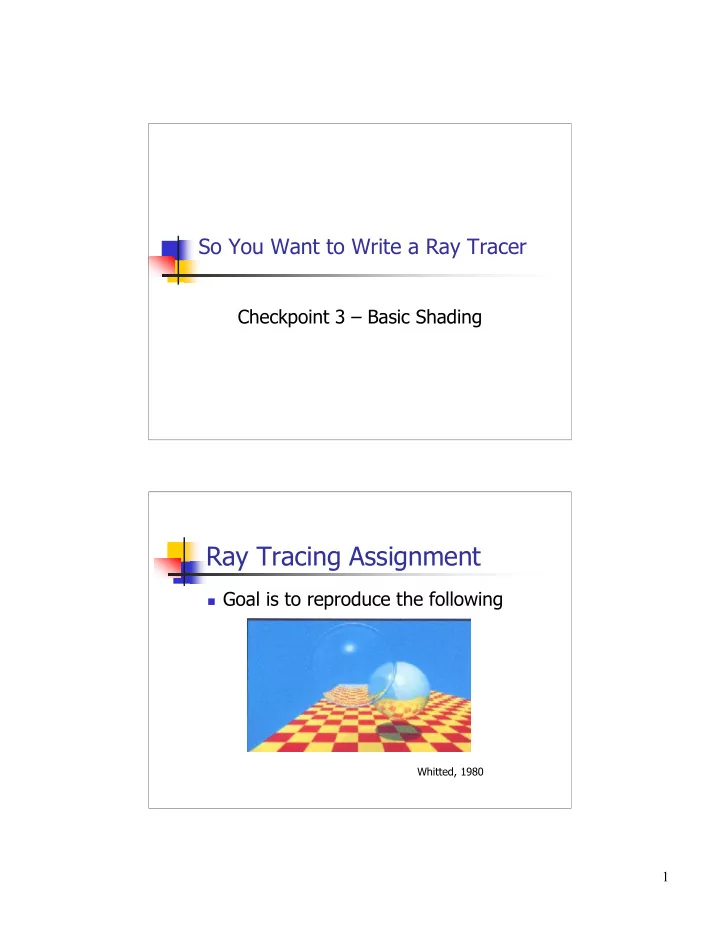

So You Want to Write a Ray Tracer Checkpoint 3 – Basic Shading Ray Tracing Assignment Goal is to reproduce the following Whitted, 1980 1
Ray Tracing Assignment Seven checkpoints Setting the Scene Camera Modeling Basic Shading Procedural Shading Recursive Ray Tracing – Reflection Recursive Ray Tracing – Transmission Tone Reproduction Ray Tracing Assignment Seven checkpoints Setting the Scene Camera Modeling Basic Shading Procedural Shading Recursive Ray Tracing – Reflection Recursive Ray Tracing – Transmission Tone Reproduction 2
Basic Shading Add Illumination Model and Shadow testing to your ray tracer. On intersection Rather than return color of object hit Check to see if point is illuminated (by spawning shadow ray) If so calculate color at intersection point using Illumination model Illumination Models Geometry N V H viewer normal Half-way R S reflection source 3
Illumination Models Geometry N - normal vector S - direction of incoming light R - direction of perfect mirror reflection H - halfway between light direction and viewing direction. V - viewing direction. Phong Model Default is to implement Phong Model introduces specular (mirror-like) reflections Viewer direction becomes more important three components ambient - background light (k a ) diffuse - Lambertian reflection (k d ) specular – mirror-like reflection(k s ) 4
Illumination Models Recall from Linear Algebra u θ v u v u v cos • = � Just one reason to normalize! Phong Model ∑ ∑ k L ( V ) = k L + k L ( S • N) + k L ( R • V) e a a d i i s i i i i ambient diffuse specular Note: L n are radiance terms, include both light and material info 5
Parameters to add To your world: Ambient light – background light (r,g,b) To the light source Color (r,g,b) gives intensity and chroma. Parameters to add To each object Phong parameters ambient - background light (k a ) diffuse - Lambertian reflection (k d ) specular – mirror-like reflection(k s ) exponent – controls size of specular highlight (k e ) Object “color” ambient / diffuse color – basic color of object Specular color – color of specular highlight (white usually) 6
Phong Model Ambient light color x light source color x light source color x ambient object color diffuse object color specular object color ∑ ∑ k L ( V ) = k L + k L ( S • N) + k L ( R • V) e a a d i i s i i i i ambient diffuse specular Only apply if you can see the light from point of intersection! Phong Model A note about ambient Ambient light is a kludge to model “background light” resulting from multiple scatterings. If shadow ray does not reach a light source…should ambient component be included? You make the call. 7
Vectors you will need Point of intersection Get from intersection calculation N - normal vector Get from intersection calculation S - direction of incoming light Light position – point of intersection Shadow ray: Need to know if we can see the light R - direction of perfect mirror reflection On next slides V - viewing direction. Camera position – point of intersection NORMALIZE ALL VECTORS Reflection Reflection Angle of incidence of ray = Angle of reflectance Perfect mirror surface � � i r d r 8
Calculating Reflection a a n S � � i r r where S is the ray from the S • n intersection point to the light r = S + 2a = S − 2 n 2 source, r is the reflected ray, n and θ r equals θ i For derivation, see http://astronomy.swin.edu.au/~pbourke/geometry/reflected. Applying Phong If there is an intersection Calculate ambient component Get the point of intersection (P) Spawn a shadow ray from P to the light source If the ray reaches the light before any other object Obtain N, V, S, and calculate R Calculate specular and diffuse components Add to ambient componet Return resultant color. 9
Basic Shading Due date: Must be posted to Web site by Monday, Jan 14. Recall: 10% penalty per day Having trouble? Let me know EARLY. Questions? Object oriented hints 10
Extra, Extra For 5 points Add support for multiple light sources Implement another illumination model Phong-Blinn (see slides) Strauss (see paper) Include multiple images on Web site if extras are implemented 11
Recommend
More recommend